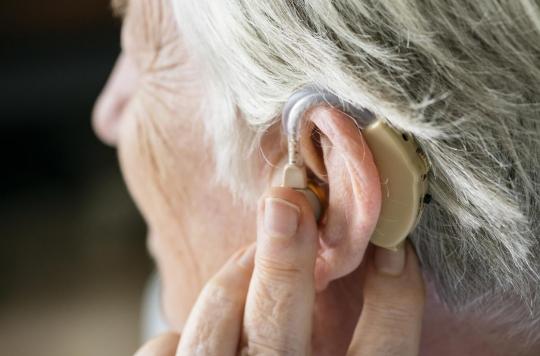According to a new study, people who wear hearing aids for age-related hearing problems maintain better brain function over time than those who don’t.

Better hearing to prevent dementia: this is the conclusion reached by a new study conducted by researchers from the University of Exeter, England, and King’s College London, and presented at the international conference of the Alzheimer’s Association, Los Angeles.
Based on extensive research conducted in recent years by the Lancet Commission on Dementia Prevention, Intervention and Care, its authors suggest that hearing loss is an important risk factor for dementia. But, according to them, wearing a hearing aid could mitigate this risk by protecting the brain from cognitive decline.
Better results on memory and attention tests
Dementia is a neurodegenerative disease often confused with Alzheimer’s. Affecting both men and women, it usually occurs between the ages of 50 and 60 and is characterized by language and behavioral disorders, as well as intellectual deterioration. This state, which is called “dementia” from a certain threshold of severity, is due to the progressive deterioration of certain parts of the brain. It also reduces the life expectancy of those affected.
To estimate the benefits of wearing hearing aids on this progressive cognitive decline, the researchers recruited 25,000 people aged 50 and over, who were split into two groups and underwent annual cognitive testing for two years.
It turned out that at the end of this period, the group equipped with hearing aids obtained better results during the tests of evaluation of the working memory and attention than the one who did not wear them. During the attention measurement exercises, people wearing hearing aids had faster reaction times.
A one-third reduction in the risk of dementia
“Previous research has shown that hearing loss is linked to loss of brain function, memory and an increased risk of dementia. Our work is one of the largest studies looking at the impact of wearing a hearing aid and suggests that wearing a hearing aid may actually protect the brain,” says lead author Dr. Anne Corbett. “We now need more research and a clinical trial to test it and perhaps incorporate it into policy to help people stay healthy later in life.”
According to his colleague, Professor Clive Ballard, of the University of Exeter Medical School, the risk of dementia could be reduced by a third if cognitive decline was taken care of early. And wearing hearing aids in the early stages of hearing loss may should be considered as a solution to prevent the risk of dementia. “At a minimum, it will improve your hearing and it might help keep your brain in shape,” he concludes.

.















